 | |
|
An up close and personal interview with U.S. Army Veteran and Togetherweserved.com Member:
SP 4 Daniel Long U.S. Army (1969-1971)
WHAT INFLUENCED YOUR DECISION TO JOIN THE MILITARY?
Like hundreds of thousands of young men in America during the Vietnam War, I was drafted. It really came as no surprise. Beginning in the 9th grade I heard of young men right out of high school being drafted. I had no plans for college so I figured the  same thing was going to happen to me and my friends as well. We also knew the war was not going to end anytime soon. same thing was going to happen to me and my friends as well. We also knew the war was not going to end anytime soon.
Every night, the television news had reporters broadcasting on the war from battlefields in the mountains near the DMZ to the streets of Saigon to the water soaked Mekong Delta. The news was always the same: the war is unwinnable, casualties are rising, the war is turning into a quagmire with no end in site. Daily newspapers and magazines were reporting the same thing but in much greater detail.
As soon as my friends and I graduated from high school, we began receiving draft letters. One by one, my friends were ordered to active duty. My draft letter arrived just days after my 19th birthday.
Throughout basic and advanced training, we were constantly reminded we would all go to Vietnam. But the harsh reality of it finally hit me sitting on the commercial jetliner taking me to California where I would later take a military flight to Vietnam. The plane was in a climb and as I looked out the window, the ground below grew further and further away. I knew my family were probably still looking at the plane disappearing into the heavy cloud cover. To reconnect in some kind of way, I took out a photo taken of the family before I left home in Tampa.
Sitting on the couch is me in uniform, my older brother, who was in the Air Force, my younger brother and sister and my mother. While I had seen the photo a few times, I studied it a little closer and saw two things I hadn't really noticed. My mother had the look of dread and foreboding. I had had the look of uncertainty. Continuing to look into her eyes and mine, I think for the first time I realized that if I survived the war, I was about to experience things that would influence the rest of my life in a very profound way.
WHAT WAS YOUR SERVICE CAREER PATH?
Following two days at the induction center in Jacksonville, Florida, I and other inductees were loaded on a bus and taken to Ft. Jackson, South Carolina for basic training. The bus entered the main gate, drove along a remote road to rows and rows of old World War II wooden  barracks where our "welcoming" committee of Drill Instructors were waiting. As soon as the bus stopped, the senior DI jumped on the bus and began screaming for us to hurry off the bus. We moved off like frightened animals. The DI kept yelling, "hurry, hurry" while calling us all kinds of contemptible names and barking out orders: "Move, move" then "don't move." If any of us called him sir, he would verbally attack us saying, "Don't call me sir. I work for a living." I thought I had arrived in hell--and I wasn't too far off. barracks where our "welcoming" committee of Drill Instructors were waiting. As soon as the bus stopped, the senior DI jumped on the bus and began screaming for us to hurry off the bus. We moved off like frightened animals. The DI kept yelling, "hurry, hurry" while calling us all kinds of contemptible names and barking out orders: "Move, move" then "don't move." If any of us called him sir, he would verbally attack us saying, "Don't call me sir. I work for a living." I thought I had arrived in hell--and I wasn't too far off.
Basic training was not easy. It was a totally foreign, sometime bizarre, world where we were pushed physically and mentally from individuals into members of a close-net team. After weeks of hard training we were proud of our accomplishment of having been molded from "green" civilians to novice soldiers. Then came graduation day, but I didn't get to go. Someone up the line decided it would be okay for those of us who would not have family attending the ceremony to perform KP (kitchen police). I was more than a little disappointed. I so wanted to proudly stand on the parade field with my platoon in a graduation ceremony we had worked so hard to reach and for which we had thought of nothing else for weeks.
My next stop was AIT (Advance Individual Training) at Ft. Knox, Kentucky where I learned how to drive and maintain APCs (Armored Personnel Carriers). While we were still treated like recruits, it was not nearly as dehumanizing as basic training. I also enjoyed learning about mechanized infantry. I did get homesick, though. I'd never been away from home that long in my entire life.
After we passed our final graduation test, we were told all of us were being assigned to Germany. This was a relief since we figured we'd be going to Vietnam. A week before graduation, we were told an additional week had been added to our training schedule. We were going to take a course on how to fight in Vietnam. It seems our orders for Germany had been changed. The Army had done it again. I couldn't go to my basic training graduation and now, my wonderful, peaceful assignment to Germany was changed to the war in Vietnam.
That night we all got drunk at a bar off post. I got into a hell of a fist fight with another intoxicated soldier. I got my ass whipped but the guy I fought was twice my size so I didn't feel too bad.
The next morning at muster, the DI walked up and down the formation. When he got to me he hesitated when he saw one of my eyes closed, black and blue marks on my face and lips swollen like an overdose of Botox. He never said a word. He just gave me a knowing smile and moved on.
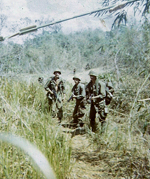 When I got to Vietnam, the heat and humidity didn't bother me. I felt like I was home in Florida, but I was taken aback by the smells. There was the stench of aviation fuel, pungent food odors, and the reeking scent of open latrines and burning feces. When I got to Vietnam, the heat and humidity didn't bother me. I felt like I was home in Florida, but I was taken aback by the smells. There was the stench of aviation fuel, pungent food odors, and the reeking scent of open latrines and burning feces.
I was assigned to Charlie Company, 1st Battalion, 12th Cavalry Regiment, 1st Cavalry Division (Airmobile). I would was now a 'grunt.' All I learned about tracked vehicles went out the window.
Charlie Company was getting ready to go to the field when I arrived at LZ Buttons near Song Be. My duffle bag and clothes were stored and I was issued jungle fatigues, jungle boots,socks and a backpack in which I was told to quickly throw in everything. I was then given a poncho, mosquito net, 'bug' juice, an M-16, four hand-grenades and ammo and taken to the 3rd Platoon, 3rd Squad. A couple of hours later we were on helicopters and combat assaulted (CA) into a landing zone in the middle of the jungle.
I made it through my one year tour in Vietnam managing to get wounded once but otherwise in pretty good shape physically, but I knew I had changed a great deal. War does that to people.
In the division rear where I was preparing to take a "freedom bird" flight back to the United States, I was approached by an NCO and asked if I'd like to reenlist for an extra year and take a promotion to sergeant. It was the easiest no I've ever said. I also knew if I stayed in Vietnam any longer, I wouldn't survive.
My final duty station was at Ft. Benning, Georgia where I was assigned to a training unit. After a year as a 'grunt' in a combat zone, I was finally assigned to drive an APC and nearly every day, I drove it downrange demonstrating to infantry students the lethality of a huge flame thrower mounted on a track vehicle.
DID YOU PARTICIPATE IN COMBAT OPERATIONS? IF SO, COULD YOU DESCRIBE THOSE WHICH WERE SIGNIFICANT TO YOU?
Although my combat tour in Vietnam was one year, it really amounted to about 10 months in the field, or as we liked to call it, the "bush" or "Indian country." The other two months were split up between processing through the Bien Hoa reception center, attending the 1st  Cavalry's "in-country orientation" program, several in-country R&Rs, an out-of-country R&R and a return to the Bien Hoa reception center for rotation back to the United States. For eight of those 10 months my unit, Charlie Company, 1st Battalion, 12th Cavalry Regiment, 1st Cavalry Division (Airmobile), conducted search and destroy operations within a few miles of the Cambodian border near the Parrot's Peak and Fishhook areas. The other two months were spent inside Cambodia's Fishhook area itself after we invaded that country in May 1970. President Nixon didn't actually call it an "invasion," however. He preferred the less offensive term "incursion." Cavalry's "in-country orientation" program, several in-country R&Rs, an out-of-country R&R and a return to the Bien Hoa reception center for rotation back to the United States. For eight of those 10 months my unit, Charlie Company, 1st Battalion, 12th Cavalry Regiment, 1st Cavalry Division (Airmobile), conducted search and destroy operations within a few miles of the Cambodian border near the Parrot's Peak and Fishhook areas. The other two months were spent inside Cambodia's Fishhook area itself after we invaded that country in May 1970. President Nixon didn't actually call it an "invasion," however. He preferred the less offensive term "incursion."
Whatever area in which we operated, however, our routine seldom varied. For 25-35 days we'd hump the jungle in search of the enemy. We'd then be pulled out of the field and fly to whichever landing zone (LZ) we were operating out of at the time and take over security. After seven days, another rifle company would come in, take over security and we'd go back out into the jungle to find and engage the enemy.
The entire time I was in Charlie Company, we were in numerous firefights but there are three that standout as being significant to me personally: my first firefight, the first time I killed a man and the first time I saw a friend killed.
My first firefight took place a few weeks after arriving to the company. We landed in a swampy LZ where Delta Company was waiting to be taken out by the same helicopter taking us in. During this process, a few enemy were shooting at us but not scoring any hits. Once the entire company was on the ground, we moved to higher land. Within ten or fifteen minutes the point element shot and killed an NVA.
 We continued moving up this large hill when we stumbled upon a long abandoned enemy bunker complex. Our company commander, Capt. Michael B. Christy, ordered us to set up our night defensive position (NDP) inside the complex. As we were doing this, one of our security elements spotted three NVA/VC getting ready to blast us with a Rocket Propelled Grenade launcher (RPG-7s) and AK-47 rifle fire. In spite of our security element firing many rounds at the enemy, the three escaped and scattered so quickly they left behind their PRG and several rounds. A patrol was sent out in the direction the enemy had fled. We continued moving up this large hill when we stumbled upon a long abandoned enemy bunker complex. Our company commander, Capt. Michael B. Christy, ordered us to set up our night defensive position (NDP) inside the complex. As we were doing this, one of our security elements spotted three NVA/VC getting ready to blast us with a Rocket Propelled Grenade launcher (RPG-7s) and AK-47 rifle fire. In spite of our security element firing many rounds at the enemy, the three escaped and scattered so quickly they left behind their PRG and several rounds. A patrol was sent out in the direction the enemy had fled.
Preparing my sleeping arrangements for the night, I spotted movement in the jungle in front of my forward position. I opened fire. Others followed. Our fire was immediately returned with heavy machine gun and rifle fire. Bullets were cracking in the air over our heads, breaking off tree twigs and digging up the ground around us. It was a vicious exchange of fire. Suddenly we heard yelling over the pandemonium, "Cease Fire! Cease Fire! The call was repeated all up and down the line until there was absolute silence coming from both sides of the battle. Capt. Christy came around later explaining to us what had happened. The lieutenant patrol leader reported taking enemy fire. He ordered his patrol to fire back. At the same time, the rest of the company in the NDP began receiving fire from a large, heavily armed force that seemed to have us surrounded. Within a minute or two, Christy realized our guys were firing at each other and yelled, "Cease Fire" as loud and as often as he could. The lieutenant had been reporting he was in a location several kilometers away but was in fact a few hundred feet from the rest of the company in the NDP. He got his ass chewed out royally.
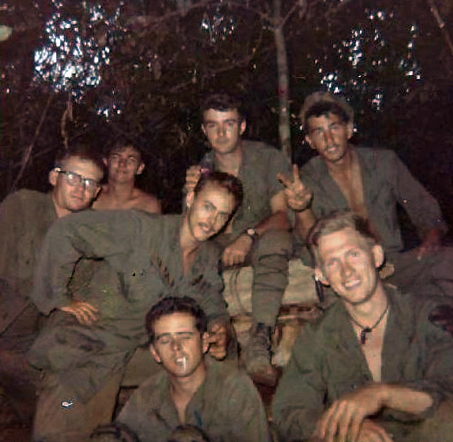 The second significant firefight was the one in which I first killed a man. Our sister company, Alpha Company, was making its way up a hill when they ran into heavy enemy resistance. The battalion ordered out company to help. The plan was for us to land on top of a hill and move down to connect with A Company. We abandoned the operation we had been conducting, found a suitable LZ and waited to be picked up. A couple of hours later we were on our way to the hilltop LZ that had been carved out of the wilderness with "daisy-cutter" bombs. It was only big enough for one helicopter at a time. I was in the first helicopter. My stomach was in my throat. If it was going to be a hot LZ, it is generally the first helicopter that gets hit. As soon as the skids hovered over the ground, we all bailed out expecting to be in a firefight in seconds. That didn't happen. I was selected to stand in the open and direct the second helicopter by hand signals into the LZ. I felt extremely vulnerable and I keep thinking, maybe the enemy are waiting for the second helicopter to land and that's when I'm sure to get hit. As the second helicopter load of 8 men were on the ground, they were directed to different sectors of the LZ to perform security. Still no enemy ambush. This continued until the entire company was on the ground. The second significant firefight was the one in which I first killed a man. Our sister company, Alpha Company, was making its way up a hill when they ran into heavy enemy resistance. The battalion ordered out company to help. The plan was for us to land on top of a hill and move down to connect with A Company. We abandoned the operation we had been conducting, found a suitable LZ and waited to be picked up. A couple of hours later we were on our way to the hilltop LZ that had been carved out of the wilderness with "daisy-cutter" bombs. It was only big enough for one helicopter at a time. I was in the first helicopter. My stomach was in my throat. If it was going to be a hot LZ, it is generally the first helicopter that gets hit. As soon as the skids hovered over the ground, we all bailed out expecting to be in a firefight in seconds. That didn't happen. I was selected to stand in the open and direct the second helicopter by hand signals into the LZ. I felt extremely vulnerable and I keep thinking, maybe the enemy are waiting for the second helicopter to land and that's when I'm sure to get hit. As the second helicopter load of 8 men were on the ground, they were directed to different sectors of the LZ to perform security. Still no enemy ambush. This continued until the entire company was on the ground.
Once the company was assembled, we moved down the hilltop into thick vegetation and deep crevices caused by centuries of erosion. It was very difficult and slow moving, especially with backpacks laden with heavy ammo, food and water. Part way down the hill, we were alerted to the possibility of enemy nearby. Capt. Christy stopped our forward movement, had us setup security where we stood and sent out a squad to check the noise we were hearing. I took this opportunity to bend over at the waist so I could shift the weight of the backpack straps digging into my shoulders. That's when I saw an enemy soldier watching us from behind heavy underbrush. I slung off my backpack, swung my M16 in his direction, yelling for him to 'surrender or die.' He seemed to freeze for a moment before raising his AK-47. I opened fire until I emptied two magazines.The enemy fell dead from a single bullet from my rifle. Most of the men around me opened fire and kept firing until it was obvious the enemy were gone. That's when I noticed an unexploded Chicom grenade next to my backpack. It was a dud. How close to death I was that day I'll never know.
 I moved cautiously toward the dead enemy. He was wearing rather clean clothes. His body was searched and we found a worn wallet containing faded photos of his mother, father, sister and brother. He also had a photo of a pretty woman who was either his wife or girlfriend. According to our Kit Carson scout/interpreter (a former enemy that had surrender and was now working for the Americans), the enemy I killed was an NVA lieutenant. It was believed I may have prevented an ambush by seeing the enemy and opening fire on him. I moved cautiously toward the dead enemy. He was wearing rather clean clothes. His body was searched and we found a worn wallet containing faded photos of his mother, father, sister and brother. He also had a photo of a pretty woman who was either his wife or girlfriend. According to our Kit Carson scout/interpreter (a former enemy that had surrender and was now working for the Americans), the enemy I killed was an NVA lieutenant. It was believed I may have prevented an ambush by seeing the enemy and opening fire on him.
We made a sweep of the area and found seven enemy backpacks neatly stacked in a row. Inside were freshly starched uniforms, canned condensed milk, uncooked rice and small bottles of fish sauce. While we were still searching the area, we got a radio call from battalion saying the enemy had retreated and Alpha Company was no longer in danger.
That night in our NDP, I felt grief for the man I had killed. He may have been an enemy trying to kill me but he was still a human being. Through the years, I've wondered if his family ever knew the manner in which he died. There are also times when I can still see his dead eyes looking into nothingness.
The third and final significant combat took place on March 7, 1970. The company was split up in separate platoons. I was in the 3rd platoon commanded by Lt. Richard Friedrich. It was late in the afternoon and we stopped to set up our NDP. Capt. Christy, who was with our platoon, had Friedrich send out a patrol to ensure no enemy were in the area. I was in the patrol but we didn't get very far before all hell broke loose back in the platoon NDP. We radioed back telling the platoon perimeter we were coming back in. When we arrived, bullets were flying all over the place. Christy ordered an artillery barrage. Within minutes the artillery smashed into the jungle all around us. During the barrage, I heard a call for a medic. Jim Downs, assisting a M-60 machine gunner, got hit in the neck, rupturing his jugular. The platoon medic tried to stem the blood gushing out of his wound but could not. With complete knowledge he was about to die, this brave young man, certain in his faith, crossed himself while reciting the Lord's Prayer. Within seconds, he fell to the jungle floor dead. Downs was the first American soldier I saw die. I've played this scene over and over in my head and have never been able to forget it. It has become a kind of tribute to the memory of Jim Downs.
WHICH, OF THE DUTY STATIONS OR LOCATIONS YOU WERE ASSIGNED OR DEPLOYED TO, DO YOU HAVE THE FONDEST MEMORIES OF AND WHY?
The duty stations and assignments I had during my two years of military service produced mostly fond memories. Take basic training and AIT for instance. I thought it was hard and I didn't much care for the way the DIs treated us, but I also realized they had a job  to do: forge individual civilians with widely dissimilar backgrounds into a team of soldiers working together toward a common end. My fondest memories, however, are about two men with whom I served in combat. to do: forge individual civilians with widely dissimilar backgrounds into a team of soldiers working together toward a common end. My fondest memories, however, are about two men with whom I served in combat.
I met Greg Egan, a boy from a remote part of Wisconsin, in AIT. I liked him from the start. He was easy going, thoughtful and strong in a quite sort of way. I also loved his laugh. When he laughed, the world seemed a better place. When he was your friend, he was always there for you.
Egan arrived in Vietnam within a few days of my arrival. We went through the First Team "orientation" program at the same time. We were both assigned 1st Battalion, 12th Cavalry Regiment and flew out together in the same helicopter to Song Be. We both got assigned to Charlie Company. We both ended up in the same platoon.
Another soldier I easily bonded with was Jim Wilson who arrived at Charlie Company around the same time as Egan and me. Jim was a laid back Southern boy from North Carolina who hadn't seen much of the world before being drafted. He seemed to be enjoying his new found world and everybody in it. Like Egan, he had an infectious laugh. It made me feel good to be around him. Perhaps because we three were the new guys (FNGs), we learned to stick together. From that grew an unbreakable friendship.
We were still the new guys when a drawing was done to see who would get the only two tickets allocated to our company for the Bob Hope show. The names of everyone in the company were placed into a helmet. The company's XO drew out the two names. The names he called were Jim Wilson and mine. A lot of "old timers," the ones who had been in country a long time, were upset. They didn't like the idea that two new guys who had not yet been baptized by enemy fire would be seeing Bob Hope and all the pretty girls he brought with him. We tried to feel sorry for those not selected but we were too excited and happy to let it bother us too much.
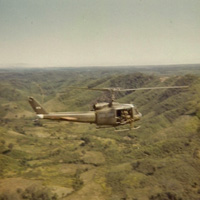 We took a supply helicopter to the rear area where the show was taking place later that day. It was a lot of fun watching the show, especially with Jim's contagious laugh. Hearing him bellow with pleasure made my joy in the show even greater. After the show we got some drinks at the EM club and managed to get a little drunk, enough so that we missed our helicopter ride back to Song Be. The next morning we hitched a ride on a helicopter heading for Song Be. We arrived just in time to go to the field with the rest of the company. We took a supply helicopter to the rear area where the show was taking place later that day. It was a lot of fun watching the show, especially with Jim's contagious laugh. Hearing him bellow with pleasure made my joy in the show even greater. After the show we got some drinks at the EM club and managed to get a little drunk, enough so that we missed our helicopter ride back to Song Be. The next morning we hitched a ride on a helicopter heading for Song Be. We arrived just in time to go to the field with the rest of the company.
The bond the three of us had grew stronger the longer we were together. After each firefight, we'd check to see if the other two were okay. We were as close as anyone can be in war. Like so many friendships spawned in wartime, we lost contact when we returned home. We reunited for the first time after 40 years at a company reunion in Myrtle Beach. We now stay in touch on a regular basis.
FROM YOUR ENTIRE SERVICE CAREER WHAT PARTICULAR MEMORY STANDS OUT?
It's been many years since I served in the Army and much has been forgotten. But I do remember those few things that impacted me when they happened or those things that continue to influence me now. The single memory that stands out the most, however, has both. 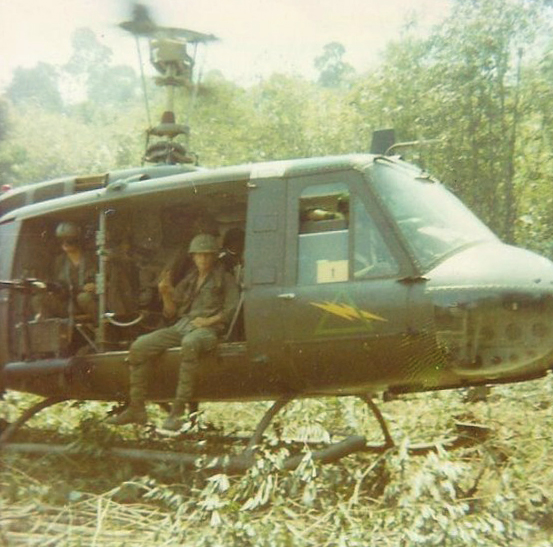 Unfortunately it is a sad memory and one I would give anything not to have. Unfortunately it is a sad memory and one I would give anything not to have.
President Nixon changed the date all American units were to leave Cambodia. Originally it was by June 30, 1970. Now he wanted us out by June 29, 1970. Our company, which had operated in Cambodia for nearly two months, had to scramble to get to a small river separating Vietnam from Cambodia. About 2 p.m., we found a large tree that had fallen across the river, providing us with a convenient bridge into Vietnam. On the other side of the river was LZ Thor, the battalion headquarters. We were instructed to set up our NDP outside Thor. A sister company was also set up a little ways to the north. We all felt a sense of relief being back in Vietnam where firefights were far less frequent.
We set up a normal defensive perimeter after coordinating fire zones with our sister company to the north. We then relaxed like we hadn't been able to do while in Cambodia. As night fell and a heavy fog rolled in, most of us went to sleep early.
Around 5:30AM, I was awakened by a loud explosion inside our perimeter. A second explosion, landing a few yards from me, sent shrapnel everywhere. Thinking we were under attack, I grabbed my rifle and ran to my defensive position. Wounded men were screaming in pain, others were screaming for medics. Men were moving around in sheer panic, others helping the wounded. I saw one of my platoon members walking around dazed with half of his bicep torn from his arm. A medic or a caring trooper ran through the fog to help him. We began hearing that it was not an enemy attack but friendly fire: two mortar rounds fired from Thor.
For days and weeks later, different reasons were circulating as to what happened. Some say it was a stoned gunner. Others said it was a bad lot of ammunition that the gun crews had been told "do not fire the mortar rounds over our heads." I'll probably never know the real reason but I do know that in less than 60 seconds, a deadly mistake cost the lives of two men and a total of 29 wounded, 19 so severely, they were evacuated out of Vietnam.
I relive that horrible night in my mind far too often.
WERE ANY OF THE MEDALS OR AWARDS YOU RECEIVED FOR VALOR? IF YES, COULD YOU DESCRIBE HOW THIS WAS EARNED?
 I received a Bronze Star Medal for valor. It was for the operation in which I killed the NVA office and, by so doing, preventing our being ambushed. I received a Bronze Star Medal for valor. It was for the operation in which I killed the NVA office and, by so doing, preventing our being ambushed.
Although I appreciate the recognition for my actions that day, I feel strongly that all I did was what I was trained to do, which is to fight back immediately when facing an armed enemy who wants nothing more than to kill me. I know that every soldier I served with in Vietnam would have done exactly the same thing if they stood where I stood and saw what I saw. These are the same soldiers who did what was expected of them and in many cases, far more.
OF THE MEDALS, AWARDS AND QUALIFICATION BADGES OR DEVICES YOU RECEIVED, WHAT IS THE MOST MEANINGFUL TO YOU AND WHY?
 The Combat Infantryman Badge has the most meaning to me. While it confirms I faced the enemy in armed combat, it has much greater worth. It means I was part of a team of strong, dedicated infantrymen who, without promise of reward, were willing to put their very lives on the line for their teammates. I saw this magnificent band of brothers day after day, battle after battle, take risks in order to help a comrade or to provide fire so others could get out of harms ways. The Combat Infantryman Badge has the most meaning to me. While it confirms I faced the enemy in armed combat, it has much greater worth. It means I was part of a team of strong, dedicated infantrymen who, without promise of reward, were willing to put their very lives on the line for their teammates. I saw this magnificent band of brothers day after day, battle after battle, take risks in order to help a comrade or to provide fire so others could get out of harms ways.
Most of us survived the war. Some did not. Others carry the scars from terrible wounds. The bond we shared was very real and shall never be forgotten.
WHICH INDIVIDUAL PERSON FROM YOUR SERVICE STANDS OUT AS THE ONE WHO HAD THE BIGGEST IMPACT ON YOU AND WHY?
 There are many people I met in the army who impacted my life. The DIs, the trainers, the leadership but most of all, it was the men with whom I served in combat. We lived together, ate together, played together, laughed together, fought together and cried together. I watched these brave men everyday exhibit courage, leadership and loyalty, both in the field of battle and off. There are many people I met in the army who impacted my life. The DIs, the trainers, the leadership but most of all, it was the men with whom I served in combat. We lived together, ate together, played together, laughed together, fought together and cried together. I watched these brave men everyday exhibit courage, leadership and loyalty, both in the field of battle and off.
Our counting on one another was beyond great, it was pure devotion to taking whatever action necessary to ensure as many of us would survive the war. We had each others' back.
I can honestly say I would not have been the person I am today if it not had been for that influence.
CAN YOU RECOUNT A PARTICULAR INCIDENT FROM YOUR SERVICE THAT WAS FUNNY AT THE TIME AND STILL MAKES YOU LAUGH?
Humor in war may seem crazy to others who have never experienced combat but for those of us who have, it was a natural diversion from the struggles we faced in Vietnam day in, day out, month after month.
Our daily routine of trudging through thick jungle or wading  through flooded rice paddies in search of the enemy was strenuous. There was heat, humidity, the smell of rotting vegetation, strange-looking bugs, lethal snakes, blood-sucking leaches--even tigers--and a vast array of fungus that made your whole body itch. There was the added burden of carrying 60 pounds or more on you back, across your shoulders and around your waist, and, of course, there is the constant threat of getting into a deadly firefight. While these are the upsetting memories of war, I also have funny moments that make me laugh even today. through flooded rice paddies in search of the enemy was strenuous. There was heat, humidity, the smell of rotting vegetation, strange-looking bugs, lethal snakes, blood-sucking leaches--even tigers--and a vast array of fungus that made your whole body itch. There was the added burden of carrying 60 pounds or more on you back, across your shoulders and around your waist, and, of course, there is the constant threat of getting into a deadly firefight. While these are the upsetting memories of war, I also have funny moments that make me laugh even today.
One night we were setting up our NDP by setting out claymores around the perimeter and automatic ambushes along any trails leading into the area, digging shallow fighting positions and constructing our 'hooches,' which consisted of stretching a poncho between two trees, hanging up our mosquito nets and blowing up air mattress. After our squad leader gave us our watch hours, we settled in. One of the men in our platoon, whose name escapes me now, grabbed a shovel and went out to relieve himself. He pulls down his pants, squats and looks up only to come face to face with an NVA. They looked at each other in complete shock and ran away in opposite direction.
I laughed so hard after he ran into the perimeter as white as a sheet and blurted out what happened. It still makes me smile whenever I think of it, especially the image of him hobbling into the perimeter with his pants hanging around his ankles.
WHAT PROFESSION DID YOU FOLLOW AFTER THE SERVICE AND WHAT ARE YOU DOING NOW? IF CURRENTLY SERVING, WHAT IS YOUR CURRENT JOB?
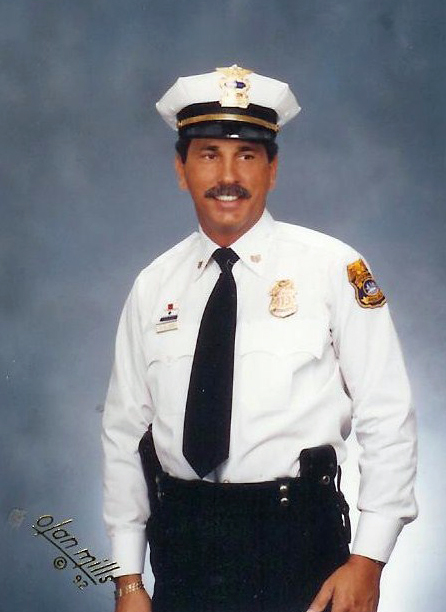 I was discharged from the Army in 1971 and decided to return to school using the GI Bill. I went to school full time and worked full time as a carpenter. After I finished school I became a liquor salesman but neither a carpenter nor a salesman really wasn't what I wanted to do. I was just looking for the right thing to come along and it did in 1977. I joined the Tampa Police force. After what I'd been through in army training and having stayed in fighting condition, I was able to get through the police academy without much difficulty. I was discharged from the Army in 1971 and decided to return to school using the GI Bill. I went to school full time and worked full time as a carpenter. After I finished school I became a liquor salesman but neither a carpenter nor a salesman really wasn't what I wanted to do. I was just looking for the right thing to come along and it did in 1977. I joined the Tampa Police force. After what I'd been through in army training and having stayed in fighting condition, I was able to get through the police academy without much difficulty.
Like most cops, my first assignment was as a rookie patrol officer. I rather enjoyed being a street cop but I wanted something a little more challenging. A position opened up in undercover narcotics. I received a call asking if I was interested. I volunteered and was selected. I stayed undercover for years but left when I made sergeant in 1985. For the next 22 years, I had a variety of supervision assignments. It began again in patrol. I again returned to narcotics and supervised undercover detectives and headed up a FBI Task Force as a deputized U.S. Marshal. Later on in my career I became a Latent Detective Supervisor Over Auto Theft and Hit and Run which included fatality crash investigations.
I moved up to supervising a unit investigating sex crimes and child abuse cases. I thought I had enjoyed seeing narcotic dealers go to jail but it wasn't even close to the satisfaction I felt when I watched sex offenders and child abusers guided out of a court room in handcuffs after being sentenced to many years in prison.
I retired from the police force in 2007 after 30 years of service.
Since leaving the Tampa Police Force, I find myself still working on my 10-acre horse farm near Tampa. I own and take care of the our remaining horses from our breeding operation. I'm not sure I will ever really retire. I do like being my own boss, however.
HOW HAS MILITARY SERVICE INFLUENCED THE WAY YOU HAVE APPROACHED YOUR LIFE AND CAREER?
Military service influenced my life in many important ways. It took a teenager with no clear direction and turned me into a man with a keen sense of right and wrong; a man wanting to make something of myself. That's why I went to school on the GI Bill. That's  why I was always looking for just the 'right' work. It took a few years, but that right thing turned out to be a career in law enforcement. It was as a policeman where my experience as a combat solider in Vietnam provided the greatest influence. I learned individual initiative works best as part of a team effort. I learned to trust my gut feelings; to develop a second sense and use it to my advantage. These instincts served me well throughout my career, especially as a supervisor guiding the work of the men and women police officer in my units. why I was always looking for just the 'right' work. It took a few years, but that right thing turned out to be a career in law enforcement. It was as a policeman where my experience as a combat solider in Vietnam provided the greatest influence. I learned individual initiative works best as part of a team effort. I learned to trust my gut feelings; to develop a second sense and use it to my advantage. These instincts served me well throughout my career, especially as a supervisor guiding the work of the men and women police officer in my units.
As an undercover officer, I routinely worked alone negotiating narcotics purchases and sales with known drug dealers. It was in these situations that I had to listen to my gut, my second sense as to whether to go forward with a transaction or to back ff. I feel for certain these instincts saved my life on more than one occasion.
Such was the case when I went to a house to make a narcotics purchase with a suspect. After I entered the house, I was somewhat surprised when he locked the door behind me. He said it was a precaution. He showed me a trafficking amount of cocaine and wanted his payment. When I told him I had to go to my car to get the money he became highly irate and yelling, "What kind of game are you playing?" I convinced him there wasn't a problem and to let my informant retrieve the money. He agreed, unlocked the door, opened it to let the informant out when he spotted my backup. He slammed shut the door, relocked it, switched off the light and ran toward the back of the house. I grabbed him in the dark, hitting with my fists and wrestled him to the floor. It took a minute or two of struggling with the suspect before the backup broke down the door with a sledge hammer. The suspect was immediately handcuffed and taken away.
I know I would have been legally justified in firing my weapon at the suspect but again, a second sense told me I could get the job done without firing. I also knew my backup had my back. Not surprisingly, two were Vietnam combat veterans.
I did shoot a suspect once in my career. I was in an undercover car with several other officers listening in on a wired female undercover officer making a deal with a suspect sitting in the passenger seat of her car parked outside a motel. We heard the suspect tell her his supplier 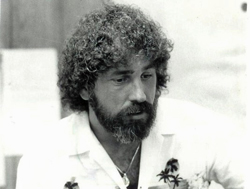 was in a truck parked in the parking lot and he was armed and would shoot anyone who tried anything. When the signal to make the arrest was given, another undercover team rushed in to grab the suspect out of our female detective's car while we tried to block in the supplier's truck. He jammed his truck in reverse, skidded backwards, almost striking several children before he crashed into a wall. was in a truck parked in the parking lot and he was armed and would shoot anyone who tried anything. When the signal to make the arrest was given, another undercover team rushed in to grab the suspect out of our female detective's car while we tried to block in the supplier's truck. He jammed his truck in reverse, skidded backwards, almost striking several children before he crashed into a wall.
I ran up to the truck with my sidearm drawn but when I got close, I saw the supplier pointing his gun at my chest. I immediately hit the ground, like I had many times before in Vietnam. I looked around for a way to get the drop on him but when I did, I saw him leaning over the open window taking aim at me. I jumped aside and fired my weapon at him, striking him in the hand. Other officers came to my assistance and together we subdued him and slapped the handcuffs on him behind his back.
His pistol, a .357 Magnum, lay on the front seat of his truck. I opened the Magnum to render it safe when I noticed it contained only four live rounds instead of six. I could not say I heard the trigger click because I was too busy avoiding the firearm but it was assumed he pulled the trigger once at my chest and once as he pointed it at me on the ground and hit the two empty cylinders. The next round would have been a live round.
Would I have sought in a career in law enforcement if I had not be in the army and in combat in Vietnam? I cannot say with any certainty, but I know I am proud for whatever role I played in protecting and keeping safe the citizens of Tampa for 30 years.
There is another wonderful thing about having been a police officer. A year after joining the undercover narcotics division I was teamed up with a female undercover detective. That lady cop and I got married 27 years ago.
WHAT ADVICE WOULD YOU HAVE FOR THOSE THAT ARE STILL SERVING?
 My biggest regret from my time in the service was not keeping a journal of my daily or weekly experiences. It never occurred to me to document one. Dates, locations of assignments, fellow soldiers' names,addresses, combat experiences etc. So I recommend one be documented. If I had kept one I could have connected with old buddies sooner and remembered all experiences in greater detail. My biggest regret from my time in the service was not keeping a journal of my daily or weekly experiences. It never occurred to me to document one. Dates, locations of assignments, fellow soldiers' names,addresses, combat experiences etc. So I recommend one be documented. If I had kept one I could have connected with old buddies sooner and remembered all experiences in greater detail.
Some of you will exit the service after a few years and some will make it a life career. Whichever path you take cherish each day. Your experiences will influence you the rest of your life. The most important thing to always remember is not to neglect your family. I realize sometimes your assignments require you to put your family second but make sure you make it up to them.
Stay safe and thank you for your service.
IN WHAT WAYS HAS TOGETHERWESERVED.COM HELPED YOU MAINTAIN A BOND WITH YOUR SERVICE AND THOSE YOU SERVED WITH?
This site has has enabled me to locate old friends and comrades I could not locate on my own. It also gave us the inpetus to reunite.
In March 2011, a member of my unit came up with the idea to travel to Washington DC to visit The Vietnam Memorial Wall. We would make a personal memory tribute to each soldier that was Killed In Action during our tour of duty with Charlie Co, 1/12th Cav. Tom Hiirst who was my Platoon Medic, came up with the idea of placing a shadowbox with personal items in each persons memory. Some members of the company donated funds to help pay for the cost.
The shadow box contained:
Reunion T shirt
A DVD containing all war photos collected and reunion photos.
A photograph of the Fallen Soldier
A photo copy of all medals awarded
A Calvary Patch
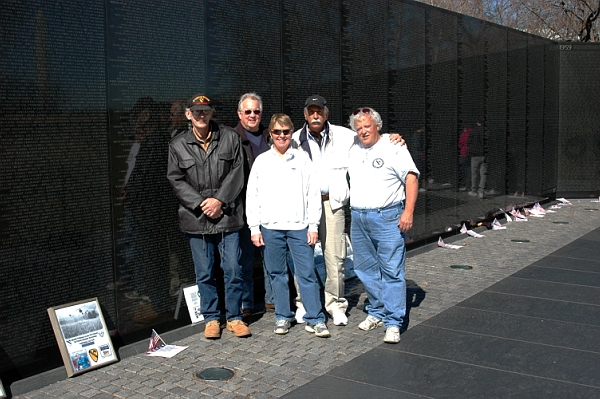 Tom Hirst and I flew to Washington where we met Al Wall another member of our company. He gave us a place to stay in his town home. The next day, Anita Rosenberg, the sister of a fallen soldier (Michael Wright) arrived and another member of our company Keith Forrey arrived to join us in our tribute. We went to the Memorial and placed each shadowbox below the name of each fallen soldier. It was very emotional for all. The air was highly charged with emotions, none of which we tried to hide. We could not mourn or loss on the battlefield but on this day, we ere able to mourn those we lost. Tom Hirst and I flew to Washington where we met Al Wall another member of our company. He gave us a place to stay in his town home. The next day, Anita Rosenberg, the sister of a fallen soldier (Michael Wright) arrived and another member of our company Keith Forrey arrived to join us in our tribute. We went to the Memorial and placed each shadowbox below the name of each fallen soldier. It was very emotional for all. The air was highly charged with emotions, none of which we tried to hide. We could not mourn or loss on the battlefield but on this day, we ere able to mourn those we lost.
|
|
|
Share this Voices Edition on:



 |
|
TWS VOICES
TWS Voices are the personal stories of men and women who served in the US Military and convey how serving their Country has made a positive impact on their lives. If you would like to participate in a future edition of Voices, or know someone who might be interested, please contact TWS Voices HERE.
This edition of Army Voices was supported by:
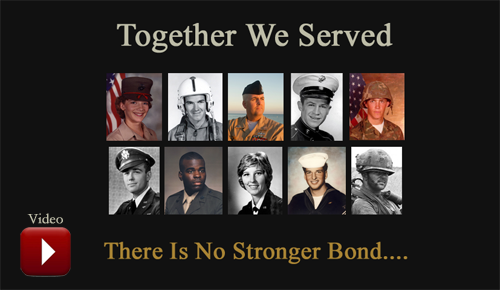
Army.Togetherweserved.com
For current and former serving Members of the US Army, US Army Reserve and US Army National Guard, TogetherWeServed.com is a unique, feature rich resource helping Soldiers re-connect with lost Brothers, share memories and tell their Army story.
To join Army.Togetherweserved.com, please click HERE.
|
|